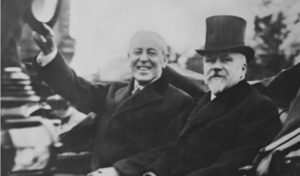
Woodrow Wilson (1856-1924) and Raymond Poincare (1860-1934), then President of France. 1919 photo taken during Wilson’s European tour to attend the Versailles Peace Conference. By Everett Historical @ Shutterstock.com
Doug Bandow, a senior fellow at the Cato Institute, explains to readers of The American Conservative the long lasting and negative effects of the Versailles Treaty. The treaty was an attempt at global organization by the same types of globalists who believe America can bring order to the Middle East. Bandow writes (abridged):
A century ago, the peace conference convened that drafted the Versailles Treaty. It was a time of hope. World War I, then variously called the Great War, the War to End War, and the War for Democracy, had mercifully ended. The worst conflict in modern history had yielded mass death, destruction, and chaos. Now a new world would be built.
Unfortunately, we are still living and suffering in that world. Today’s social engineers are pikers compared to the sanctimonious, hypocritical megalomaniacs who in early 1919 sought to reorder the globe to their fantasies. In doing so, they planted the seeds of World War II a generation later, as well as innumerable smaller conflicts in succeeding decades. Their legacy warns us against the modern Sirens who insist that America’s responsibility is to reorder the world, enforced by constant war if necessary.
By the late 1930s, many of Versailles’ requirements had been reduced to dead letters by German aggression and allied acquiescence. Tragically, the victors had fallen between two stools, willing neither to ruthlessly impose a Carthaginian peace nor to reconcile with the new democratic republic.
The ensuing global conflagration wiped away additional aspects of the Versailles order. And the end of the Cold War and collapse of the Soviet Union would complete the destruction of Versailles. A similar process of disintegration transformed the Middle East. Lebanon, Syria, Iraq, Israel, Saudi Arabia, and the other Gulf states emerged out of the wreckage of the Ottoman Empire and British-French line-drawing. Gradually the allies departed, forced out by the aftermath of World War II and rising Arab nationalism.
Yet a century later, voices continue to insist that Washington engage in additional military interventions, line-drawing, and global social engineering. Hopefully political leaders will eventually learn from the disastrous experience of 1919.
Read more here.
If you’re willing to fight for Main Street America, click here to sign up for my free weekly email.





